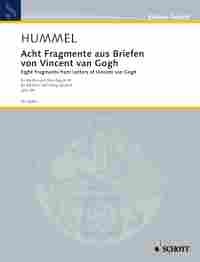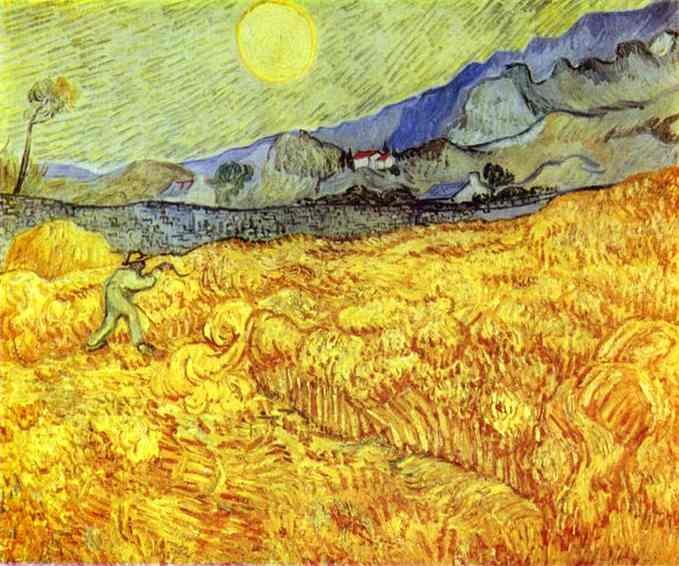"Eight Fragments from letters of Vincent van Gogh" for Baritone and String Quartet, op. 84

First
performance : December 2, 1985, Würzburg, Hochschule für Musik
Martin
Hummel / Seraphim-Quartett Stuttgart: Margret Hummel / Sonoko Imai / Florian Hummel
/ Matthias Neupert
Duration: 19 minutes
Publisher: Schott Music ED 20241 / ISMN: M-001-14888-7| I. | II.. | IV. | V./VI. | VIII. |
Eight fragments from letters of Vincent van Gogh
I.
I
feel a force in me - a fire that I must not put out, but must keep ablaze, although
I don't know to what end it is leading me and I dare say, a sombre one would not
surprise me.
to Theo van Gogh, 5 November 1882, The Hague
II.
Outside
it is dreary; the fields are a clay-pit all clumpy with heavy earth and a little
snow; the days here mostly are misty and dirty; morning and evening the ruddy
sun, crows and dried-up grass and withered rotting green; black are the bushes
and the twigs of the poplars and the willows sharp as wire rigid against dismal
sky.
to Theo van Gogh, 1 January 1885, Nuenen
III.
Those
who believe not in sunlight truly are infidels.
to Theo van
Gogh, 11 August 1888, Arles
IV.
Oh,
that beautiful sun just here in midsummer. It beats down on one's head now and
for me there's no doubt that it's leading to craziness. But, since I'm crazy anyway,
I simply enjoy it.
to Emile Bernhard, 18 August 1888, Arles
V.
Though
I am often in turmoil, there's still deep in me, despite this, a peacefulness
and purest harmony and music.
to Theo van Gogh, 20 July 1882,
The Hague
VI.
A
man may have a great fire in his soul, but no-one ever comes stopping there to
warm himself; and the passers-by will only see a whisper of smoke drifting upwards
from the chimney and then they will continue along their way.
to
Theo van Gogh, July 1880, Borinage
VII.
A
man who does not feel small, who does not grasp that he's a grain of dust, makes
a fundamental error.
to Theo van Gogh, 4 November 1883, Drenthe
VIII.
I
saw in this reaper a vague figure like a devil, battling in the glowing midday
heat so that his labour soon may be ended. I see in this man the image of death
and mankind is the corn that is reaped; but in this death there is no sadness,
all takes place by bright light of day with such a sun that floods all things
with pure and richest golden streams of light.
to Theo van Gogh,
4th or 5th September 1889, Saint-Rémy
English
translation of German Version by William Buchanan and Martin Hummel (2006)

Reaper. 1889. Oil on canvas. Vincent van Gogh Foundation, Rijksmuseum Vincent van Gogh, Amsterdam, the Netherlands
This picture is the theme of the last fragment.
With
his "Eight Fragments from letters of Vincent van Gogh" for
Baritone and String Quartet, op. 84 (published in 1988), Bertold Hummel put
musicians together in a way which probably appeared for the first time during
the 20th century. There are few song cycles - and these are hardly known - for
this distinctive combination. Yet this is not the only reason why Hummel's Van
Gogh songs are striking: the setting of prose is unusual in lyrical composition
and expresses a modern attitude. As in the category opera ("Pelléas
et Mélisande" (1902), a prose drama by Maurice Maeterlinck), Claude
Debussy takes the leading place in the category song (with piano), setting in
his "Proses lyriques" (1893) his own prose texts. In more recent times,
let us note Paul Hindemith, important as "school founder" for Hummel,
who in 1933 - certainly with a clear reference to political events - wrote songs
with piano with prose texts by Matthias Claudius. As later examples, prose texts
from the "Illuminations" by Arthur Rimbaud were set by Benjamin Britten
("Les Illuminations", op.18, 1939) and by Hans Werner Henze ("Being
Beauteous", 1963), both by the way with strings - though not with quartet
accompaniment. The prose text results in Hummel's music also generally having
no regular periodic metre, although in parts of the Van Gogh cycle he does not
do entirely without symmetrical correspondences and sequences. We see here also
the transition to simple speech: in Fragment III as well as in the Fragments
VII and VIII, in which speaking appears more or less as a dying echo of
the preceding sung phrase.
The selection of these text fragments seems additionally
justified because Van Gogh's letters to his brother have the rank of literature.
Religious feelings, sensitive expression of visual impressions, existential loneliness
and a burdened mind struggling in vain for balance (Van Gogh shot himself at the
age of 37) are all made manifest in these self-testimonies. One of the principal
elements in Van Gogh's great pictures - sunlight - is also a central theme
of these text passages. The Fragments III and IV relate directly
to this, and the final, VIII, leads to the closing words "with
a sun shining upon everything with light and superabundant gold." Hummel
repeats the last word ("shining" in the German text) several times and
expresses the glitter in the quartet through the tremolos, arpeggios, harmonics
and trills (at the end superimposed layers of trills in thirds), with which the
work finally fades from pianissimo to al niente in extreme upper tessitura.
Even more unmistakably than here, the centre E, yes, explicitly E major,
functions as a symbol of light at the end of Fragment III, as does
the E major to which Hummel leads at the end of Fragment V
on the word music, clearly to be seen in the same context. In Fragment IV,
the e''' in the 1st violin represents the sun, but the motif that develops
out of it suddenly plunges aggressively into the depths and threatens "the
head".
We find a parallel to the light symbolism of the E in
Gerhard Frommel's "Vier Gesängen nach Gedichten von Baudelaire-George"
("Four Songs after Poems by Baudelaire-George") of 1942. In Hummel's
case, the E left sounding alone can also characterise loneliness, as at
the end of Fragment VI ("and go on their way, leaving it
behind").
Corresponding to the sun is the great fire in the soul
(Fragment VI), a fire that I must not allow to be extinguished,
as Fragment I puts it.
The chromaticism shows the completely
different character of this inner force, as does also the pressing, restless changing
time signature. Typical for Hummel are the successively superimposed intervals
(double-stopping in sixths), which here result in a composite sound of eight notes.
They appear similarly in the final Fragment at the words I see in
this the image of death, but now pianissimo and in closer tessitura. Here we have
a fitting demonstration in this, the Fragment of latest date amongst the selection
(1889), of the unity we once again observe in a Hummel cycle.
Wolfgang Osthoff (in "Zu den Liedern Bertold Hummels", Tutzing, 1998)
Press
Mittelbayerische Zeitung Regensburg, 31st November, 1987
With the "Eight Fragments ", Bertold Hummel has successfully
created a most impressive work. Uncommonly concentrated in the evoking of atmosphere
and reflecting the texts strongly, these "dark grey songs" - to quote
Ludwig Hirsch - develop a sadly expressive, almost somnambulant charm. These songs
seem to have become Bertold Hummel's completely inwardly turned "Winterreise",
the epigram of a psychosis, full of concealed suggestion and dark references,
but always more full of hope. The "sun" becomes the constantly invoked
bearer of hope. The music is highly expressive, exploiting the various performing
and bowing possibilities of the stringed instruments and their capacity for nuances
to the limits; occasionally oppressive visions in sound appear. It is music in
danger, of a most fragile balance. Nor are subtle musical references missing.
With only one note, following the word "music", harmony and tonality
are conjured up.
Reinhard Söll
Neue Musik Zeitung 4/5, 1986
A setting of burning, glowing inner intensity, to whose melodic motion the prose texts of the painter van Gogh have been accommodatingly entrusted and whose artistic message was perfectly fitted to present to the audience, gathered eagerly out of personal sympathy and objective interest, as a statement of faith.